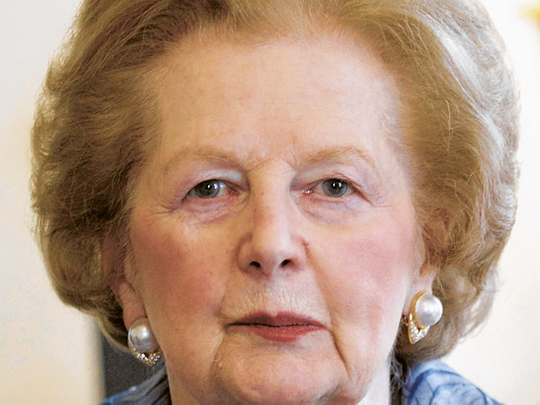
Dubai: There is a cruel irony in that the most dominant female figure of the last decades of the 20th Century has no lasting memory of how she changed the world.
As she sits in the drawing room in London’s tasteful Belgravia district – her neighbours are embassies and people of good breeding – she cannot recall the Miners’ strike that ripped apart the fabric of northern England, the hunger strikes that ripped apart the fabric of Northern Ireland, nor how she struck at the very heart of post Second World War Britain, dismantling its nationalised industries and services one by one.
Maggie, as she was derisory called by those who despised here – and there were many – is now in her 88th year and suffering from dementia.
She is too old and too frail to be feted, and the hourglass is emptying on her extraordinary life.
She has little memory of her early years working as a research chemist, nor of her childhood growing up her father’s store in Grantham where he was a Conservative member of the local council.
Her first foray into politics was in 1950 where Ms Margaret Roberts was defeated in her attempt to unseat a popular MP for Dartfort. She lost but won plaudits for her dignity and her speeches espousing pure Conservative values of tight fiscal polices and family first.
For the next nine years, she did put her family first – marrying Dennis Thatcher and focusing on her twins, Mark and Carol. She found time to become a barrister – but the draw of politics was too strong.
Her election in 1959 as MP for Finchley began a four-decade long crusade to impose her values on the nation.
“In politics, if you want anything said, ask a man; if you want anything done, ask a woman,” she once quipped. But her achievements were remarkable. She may have been Britain’s first woman Prime Minister, but for those who questioned her resolve or abilities did so at their peril.
As Education Secretary, she famously abolished free milk to all schoolchildren – earning her the tabloid headline “Thatcher the Snatcher”. She was more upset that she couldn’t get Prime Minister Edward Heath to listen to her ideas.
Banished to opposition in the 1974 general election, she became a central figure in rebuilding the party. She challenged Heath for the party leadership and won, setting the stage for her eventual entry into 10 Downing Street.
That came in May, 1979 at a time where unions dominated the economic agenda, inflation was rampant, and there was no end to the violence in Northern Ireland.
She responded with an aggressive remedy of raising interest rates to control inflation, dismantle laws giving unions power, and sent more troops into Ulster. Railways and public transport were privatised, water and electricity utilities privatised, and council homes sold off to their long-time tenants, turning renters into property owners with a genuine stake in their communities.
Great Britain was greatly divided, ripped apart by social upheaval and violence on the picket lines. With a general election looming in 1983, there seemed to be little home of her remaining in power.
But a little faraway and forgotten corner of the Empire changed everything. Argentina’s military junta invaded the Falklands to reclaim their territorial rights, and they hoped that no one would notice nor care.
But this was to be Maggie’s finest hour. Whipping up every ounce of jingoism against the junta, she dispatched a makeshift fleet of Royal Navy vessels, freighters and container ship, and cruise liners acting as troop transports. And despite setbacks as Exocet missiles hit a frigate, container ship and a fleet auxiliary vessel, her troops marched their way into Stanley to claim victory. Britain was great again, so was she, and so was a second term.
And her mettle was proven again when, in Northern Ireland, convicted IRA prisoners took turns starving themselves to death to be deemed as political prisoners with special rights, not just ordinary criminals.
First Bobby Sands – elected as an MP as he lay dying in Long Kesh, then a succession of others. But she did not give way.
In 1984, she survived a IRA bombing of her hotel in Brighton as the Conservative Party met. She was in an adjacent room when the bomb went off. She was uninjured but badly shaken – but the next day she addressed the conference unbowed and unbroken.
In her third term, she changed local taxation, introducing a poll tax, imposing levies on the number of individuals living in a home, not on the home itself. Like most of her policies, it struck at the heart of Britain, with more densely populated urban and lower class areas paying disproportionally more than wealthier, lower density homes.
The riots and protests were too much for senior colleagues in the party. After a decade at the helm and fears that she would be a liability for a fourth straight term, she decided to step aside.
In the end, she was undone by her own party members. For all that she had done, her role was undone by intrigue and petty party politics.
Maybe it’s just as well her memory is gone.












